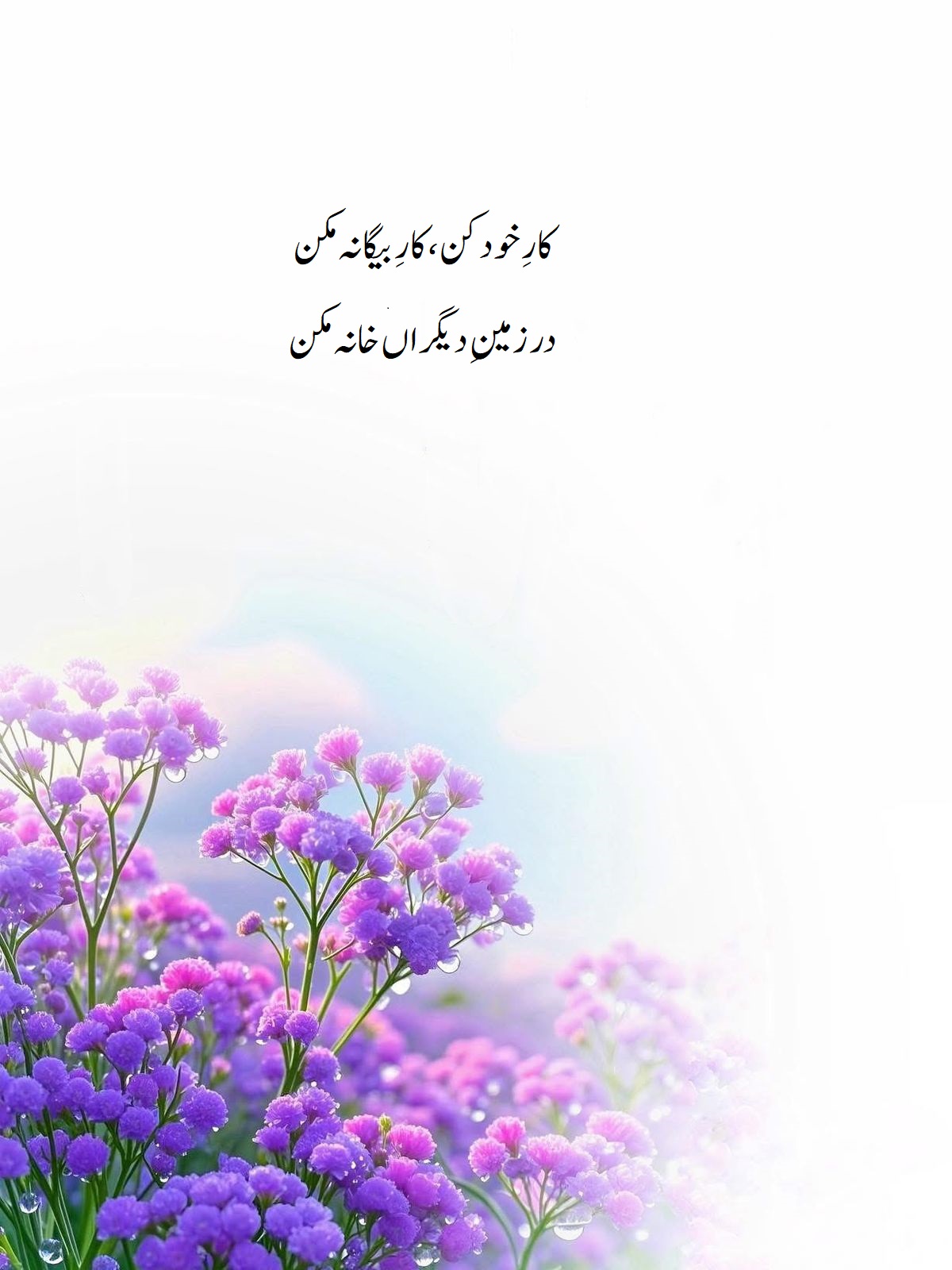ATTEND TO YOUR OWN TASK, LEAVE OTHERS ALONE
کارِ خود کن، کارِ بیگانہ مکن
در زمینِ دیگراں خانہ مکن
This is a beautiful and profoundly insightful couplet from Moulana Rumi (Rahmatullahi alaih) , getting to the very heart of spiritual practice and social conduct.
Rhyming Translation
Attend to your own task, leave others alone, And in others’ soil, build no hearth nor throne.
Commentary: The Path of the Seeker of Allah and the Peril of Interference
Moulana Rumi’s couplet is a two-part instruction that moves from the outer world of action to the inner world of the soul. It is not merely a piece of social advice but a foundational principle for anyone on a spiritual path.
“کارِ خود کن، کارِ بیگانہ مکن”
(Attend to your own task, leave others alone)
This first line is a call to radical self-responsibility and focus.
- The “Own Task” (کارِ خود): For a Seeker of Allah, the “own task” is singular: the inner work of self-purification (tazkiya-e-nafs), remembrance of Allah (zikr), and overcoming the ego (nafs). It is the labour of polishing the heart so it can reflect the Divine. This is a full-time occupation that requires immense energy and vigilance. When Moulana Rumi says “کارِ خود کن,” he is urging the seeker to be utterly consumed by this primary mission.
- The “Affair of Strangers” (کارِ بیگانہ): This refers not just to strangers, but to anything that is not one’s own spiritual work. It includes:
- Judgment: Assessing others’ faults, their spiritual status, or their life choices.
- Gossip and Backbiting: Engaging in speech about others, which only darkens the heart.
- Unasked-for Advice: Intervening in others’ journeys without being invited. Each soul has its own path and its own pace, ordained by Allah Ta’ala.
- Meddling: Trying to control outcomes in relationships or communities to suit one’s own ego’s desire for order or recognition.
The Spiritual Danger: Interfering in “others’ affairs” is a trick of the ego. It makes us feel righteous, superior, and busy, while distracting us from the much more difficult task of confronting our own inner poverty and darkness. It is a flight from the self. A Seeker of Allah understands that reforming one’s own soul is the greatest service one can offer the world.
“در زمینِ دیگراں خانہ مکن”
(And in others’ soil, build no hearth nor throne.)
This second line provides a powerful metaphor for the first. It speaks to the concepts of attachment, ownership, and identity.
- “Others’ Soil” (زمینِ دیگراں): This represents the domain of another’s life—their reputation, their relationships, their spiritual standing, their material possessions, their personal struggles. It is the “land” that does not belong to you.
- “Build no Hearth nor Throne” (خانہ مکن): The “hearth” (khanah) is a place of warmth, home, and emotional investment. The “throne” is a symbol of authority, control, and rulership.
- Do not build a Hearth: Do not become emotionally invested and entangled in the dramas of others. Do not make your sense of comfort and “home” dependent on how others behave or what they think of you. Your peace must be found within, in your own connection with the Divine.
- Do not build a Throne: Do not seek to establish your authority, your opinion, or your control over another person’s life. Do not play the ruler in a kingdom that is not yours. The mystic seeks to be a humble servant, not a king in the domains of others.
The Path of the Seeker of Allah:
For the one who yearns for Allah, this couplet is a map for conserving and directing spiritual energy. The path to Allah is one of letting go—of the ego, of attachments, of the need to control. By minding one’s own inner work and refusing to build structures of attachment and control in the lives of others, the Taalib/Taalibah (Seeker of Allah Jalla Shaanuhu):
- Purifies the Heart: The heart becomes clear of the debris of judgement, jealousy, and resentment.
- Cultivates True Compassion: Instead of interference, one learns to offer silent prayer and unconditional love. You hold a space for others without invading it.
- Achieves Inner Peace: Your peace is no longer hostage to external circumstances or the actions of others.
- Aligns with Divine Will: You acknowledge that every soul is on its own unique journey back to Allah, and you surrender the role of “manager of the universe” to the One who is truly in charge.
In essence, Moulana Rumi (Rahmatullahi alaih) is guiding us to tend to our own inner garden with such dedication that we have neither the time nor the desire to criticize the state of our neighbour’s. By perfecting our own work, we naturally become a source of light and peace for all, without ever having to intrude.
The beauty of Moulana Rumi’s work is its endless depth—a single couplet can provide a lifetime of contemplation and practice.
May your own “work” and “garden” be fruitful and your heart be enlightened.
Was-Salaam
(Khairun Nisa)

